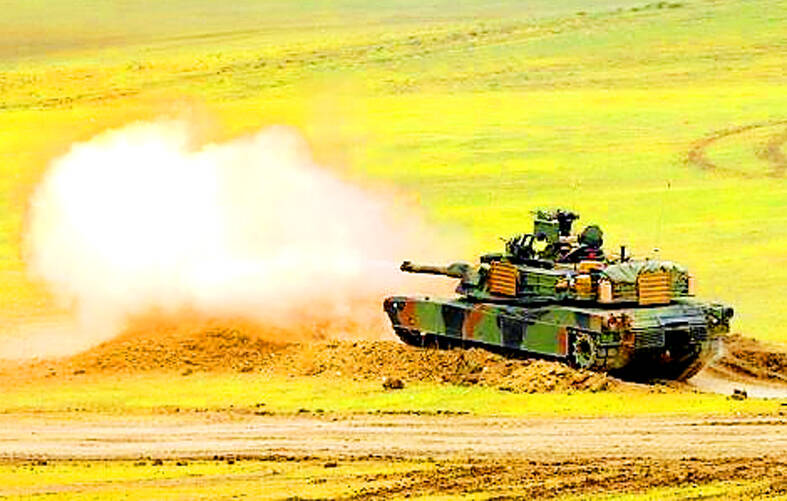The nation’s defense capability is to see a boost over the next four years, as the military is expected to acquire major equipment such as M1A2T tanks, light cruisers and F-16V jets, but production delays are likely to continue posing challenges.
With some analysts saying that Beijing is eyeing an invasion deadline of 2027, Taiwan’s military readiness over the coming years is of critical importance.
Based on the Ministry of National Defense’s published budgets, the military from now until 2027 is scheduled to receive a significant amount of new armaments.

Photo: Reuters
The army is to receive delivery of 108 M1A2T Abrams main battle tanks and 29 M142 High Mobility Artillery Rocket Systems (HIMARS), while the navy is expecting nine more Tuo Chiang-class corvettes, a new type of rescue ship, the domestically developed Hai Kun (海鯤) submarine, two light cruisers and 32 shore-mounted Harpoon missile systems.
In the air force, delivery of 39 more Yung Ying (勇鷹) advanced jet trainers, 66 F-16V Block 70 jets and four MQ-9B drones are expected.
In addition, a special budget implemented from 2022 is providing the funds necessary to acquire missiles and advanced ships by 2026.
This in particular includes the Wan Chien (萬劍) cluster munitions missile optimized for striking enemy airports that is to enter mass production this year, while the Hsiung Sheng (雄昇) surface-to-surface cruise missile and Chien Hsiang (劍翔) drone for countermeasures on land are to be acquired by next year.
However, the acquisition of new equipment has not always been smooth.
Impacts over the past few years from the COVID-19 pandemic and the Russian-Ukraine war have delayed military production capacity across the globe, including that of US equipment already purchased by Taiwan.
For example, the first two of the 66 F-16Vs purchased by Taiwan were scheduled for delivery last year, and all were to be delivered by 2026.
However, the ministry in May last year updated its delivery forecast for the first batch to the third quarter of this year, although it kept the 2026 estimate for completion of the entire order.
As for the four purchased MQ-9B drones, the ministry last year told lawmakers that it hoped for delivery in two batches next year, but revised the estimate to 2027 due to flight testing, training and other factors.
Despite concerns about delays as large shipments of Javelin and TOW anti-tank missiles are being diverted to Ukraine, the ministry’s budget for this year is unchanged from last year.
The army is expecting receipt of 1,240 TOW missiles and 200 Javelin missiles this year, showing that the delivery schedule has not been affected.

A magnitude 5.6 earthquake struck off the coast of Yilan County at 12:37pm today, with clear shaking felt across much of northern Taiwan. There were no immediate reports of damage. The epicenter of the quake was 16.9km east-southeast of Yilan County Hall offshore at a depth of 66.8km, Central Weather Administration (CWA) data showed. The maximum intensity registered at a 4 in Yilan County’s Nanao Township (南澳) on Taiwan’s seven-tier scale. Other parts of Yilan, as well as certain areas of Hualien County, Taipei, New Taipei City, Taoyuan, Hsinchu County, Taichung and Miaoli County, recorded intensities of 3. Residents of Yilan County and Taipei received

Taiwan has secured another breakthrough in fruit exports, with jujubes, dragon fruit and lychees approved for shipment to the EU, the Ministry of Agriculture said yesterday. The Animal and Plant Health Inspection Agency on Thursday received formal notification of the approval from the EU, the ministry said, adding that the decision was expected to expand Taiwanese fruit producers’ access to high-end European markets. Taiwan exported 126 tonnes of lychees last year, valued at US$1.48 million, with Japan accounting for 102 tonnes. Other export destinations included New Zealand, Hong Kong, the US and Australia, ministry data showed. Jujube exports totaled 103 tonnes, valued at

TRUST: The KMT said it respected the US’ timing and considerations, and hoped it would continue to honor its commitments to helping Taiwan bolster its defenses and deterrence US President Donald Trump is delaying a multibillion-dollar arms sale to Taiwan to ensure his visit to Beijing is successful, a New York Times report said. The weapons sales package has stalled in the US Department of State, the report said, citing US officials it did not identify. The White House has told agencies not to push forward ahead of Trump’s meeting with Chinese President Xi Jinping (習近平), it said. The two last month held a phone call to discuss trade and geopolitical flashpoints ahead of the summit. Xi raised the Taiwan issue and urged the US to handle arms sales to

BIG SPENDERS: Foreign investors bought the most Taiwan equities since 2005, signaling confidence that an AI boom would continue to benefit chipmakers Taiwan Semiconductor Manufacturing Co’s (TSMC, 台積電) market capitalization swelled to US$2 trillion for the first time following a 4.25 percent rally in its American depositary receipts (ADR) overnight, putting the world’s biggest contract chipmaker sixth on the list of the world’s biggest companies by market capitalization, just behind Amazon.com Inc. The site CompaniesMarketcap.com ranked TSMC ahead of Saudi Aramco and Meta Platforms Inc. The Taiwanese company’s ADRs on Tuesday surged to US$385.75 on the New York Stock Exchange, as strong demand for artificial intelligence (AI) applications led to chip supply constraints and boost revenue growth to record-breaking levels. Each TSMC ADR represents